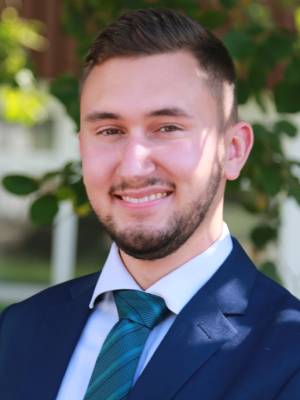 |
M. Sc. Christian KanarskiRoom F-006Kaiserstraße 2, 24143 Kiel, Germany Phone: +49 431 880-6144 E-mail: ORCID: Google scholar: Link |
|---|
Research: Real-time Autonomous Hydroacoustic Object Detection
The detection of backscattering objects of hydroacoustic waves underwater (e.g. gas bubbles, fish or other backscattering objects in the water column and on the seafloor such as munition and other artificial structures) is an ongoing research topic. For gas bubble detection and flux classification, properties like the gas flow rate, bubble sizes and the total gas flare volume have to be extracted from water column images. These are recorded by hydroacoustic SONAR imaging systems, mounted on e.g. landers, moorings or on autonomous underwater vehicles (AUVs). To achieve optimal classification in an efficient, robust and unsupervised manner, the SONAR system has to be controlled autonomously with real-time adaption to its environment. Environmental constraints and system limitations, such as battery capacity, have to be considered for optimal use of limited resources. Such a "cognitive" system can be controlled by a reinforcement learning agent: It strikes a balance between exploration (of uncharted territory) and exploitation (of learned knowledge) while learning from interactions with its environment to achieve the given goal of detection and classification.
The research aims at the analysis and real-time realization of a cognitive Multi-Input Multi-Output (MIMO) SONAR system for the detection of e.g. gas bubbles underwater. While conventional acoustic systems are using mainly beamformer-based approaches, the focus of this project lies in the utilization of individual orthogonal signals for each projector, allowing for improved parallelism in the data analysis. Furthermore, adaptive Doppler analysis can improve the performance of pattern recognition schemes for gas bubble or fish detection, especially in the presence of interfering objects (e.g. fish swarms interfering with bubble detection). Besides the innovations in terms of the new acoustic front-end, its MIMO-SONAR modes and the corresponding signal enhancement and detection schemes, the cognitive aspect of utilizing deep reinforcement learning for autonomous control will be the focus of investigation. Examples for such aspects are the choice of ping durations, beams and Doppler spread distributions, but also impacts on the predefined mission e.g. adaption of the SONAR search and processing mode for target detection enhancement. Finally, machine-learning techniques (e.g. deep neural networks) are investigated to achieve the accurate classification of the gas flux properties, based on the water column images generated by the system.
Related topics:
- MIMO-SONAR
- Reinforcement Learning
- Pattern Recognition
- Physical Oceanography
Further interests:
- Deep Learning
- Acoustic Audio Effects
- Nonlinear Systems & Dynamics
Short CV
| Time span | Details |
|---|---|
| 2022 - current | Research assistant at the GEOMAR – Helmholtz Centre for Ocean Research Kiel and the Christian-Albrechts-Universität zu Kiel, Kiel, Germany |
| 2020 - 2022 | M.Sc. in Electrical Engineering and Information Technology Christian-Albrechts-Universität zu Kiel, Germany |
| 2019 - 2020 | Software Engineer for Breath-Alcohol Analyzers, Internship Dräger Safety AG & Co. KGaA, Lübeck, Germany |
| 2016- 2020 | B.Sc. in Electrical Engineering and Information Technology Christian-Albrechts-Universität zu Kiel, Germany |
Publications


C. Kanarski, B. Kaulen, F. Kühne, M. Driesen, K. Gussow, F. Röhrdanz, K. Karatziotis, L. Schirmer, R. Burgardt, V. Boichenko, G. Schmidt: Charakterisierung der Dämpfungseigenschaften von akustischen Dämmmatten in einer Unterwassertankumgebung, Proc. DAGA, Germany, 2025


K. Karatziotis, K. Gussow, B. Boichenko, C. Kanarsaki, B. Kaulen, F. Kühne, M. Driesen, F. Röhrdanz, L. Schirmer, R. Burgardt, G. Schmidt: Classification of Vessel Types by Means of Machine Learning, Proc. DAGA, Germany, 2025


L. Schirmer, M. Boueke, C. Kanarsaki, B. Kaulen, F. Kühne, M. Driesen, F. Röhrdanz, K. Karatziotis, K. Gussow, B. Boichenko, R. Burgardt, G. Schmidt: Acoustic-magnetic Signatures of Vessels, Proc. DAGA, Germany, 2025


F. Kühne, B. Kaulen, C. Kanarski, F. Röhrdanz, K. Gussow, G. Schmidt: Detektion und Klassifikation von Objekten aus von SONAR-Systemen erstellten Plots mithilfe von künstlicher Intelligenz, Proc. DAGA, Germany, 2024


K. Gussow, B. Kaulen, F. Kühne, C. Kanarski, F. Röhrdanz, M. Driesen, S. Rautenberg, J. Abshagen, E. Mackensen, D. Meyners, E. Quandt, G. Schmidt: Untersuchung des Einflusses verschiedener Array- Öffnungswinkel bei MIMO-SONAR-Systemen, Proc. DAGA, Germany, 2024


B. Kaulen, F. Kühne, O. Wisch, C. Kanarski, K. Gussow, G. Schmidt: Entwurf und Konzeptionierung eines Mehrkanal-Wiener-Filters in einem aktiven SONAR-System, Proc. DAGA, Germany, 2023


C. Kanarski, B. Kaulen, F. Kühne, O. Wisch, K. Gussow, S. Christensen, G. Schmidt: Deep Reinforcement Learning for Autonomous SONAR Port Monitoring, Proc. DAGA, Germany, 2023


F. Kühne, O. Wisch, B. Kaulen, C. Kanarski, K. Gussow, G. Schmidt: Entwurf einer Signalverarbeitung für räumlich verteilte MIMO-SONAR-Systeme, Proc. DAGA, Germany, 2023


K. Gussow, B. Kaulen, O. Wisch, F. Kühne, C. Kanarski, H. Lewitz, E. Quandt, G. Schmidt: Entwurf und Implementierung einer schnellen 3D-Direktivitätsmessung und automatischen Entzerrung von akustischen Schallwandlern, Proc. DAGA, Germany, 2023
